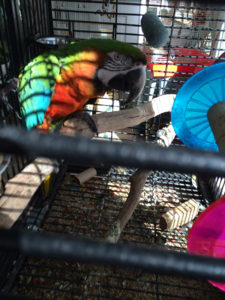Things to Consider Before Purchasing a Pet Bird
- EDUCATE! EDUCATE! EDUCATE! Buyer Beware! It is up to YOU to educate yourself BEFORE you purchase a pet bird. Determine which birds appeal to you and read about those particular species so you can decide which one will be best for you (your family). Remember, the person selling you the bird (breeder, store clerk, individual) will not always tell you all you need to now about your FUTURE with your bird.
- Learn all you can about a bird’s life in the wild. The more you know about their behavior in the wild, the more you can apply that knowledge in understanding their behavior, and hopefully, avoid potential problems in captivity. Remember that these birds, although tame from human hand feeding and imprinting, are still WILD creatures and possess instincts that are inbred in them. There are physical and emotional attributes about these birds that you cannot change.
- Learn what to expect from your pet bird after the “baby” stage, and well into the future, i.e.: what happens when it become sexually mature, how will it adapt to the introduction of another bird(s) should you decide to add more to your bird family, how to react to unexpected negative behavior, due in part, to their complex psyche, etc.
- Find out how to handle emergency situations such as a broken blood feather, broken beak or broken talon. These are the most common medical emergencies faced by pet bird owners. How you handle these situations will determine whether the bird lives, or dies of hemorrhage. Know how to recognize the signs and symptoms of illness, i.e.: lethargy, fluffed up, no appetite, personality change.
- Locate an AVIAN vet. NOT ALL VETS ARE AVIAN VETS. Currently there are less than 100 Certified Avian Vets in the entire U.S. Other vets, though, have taken their own time and money to educate themselves by traveling to conferences, symposiums and research facilities across the nation to keep abreast of the latest diseases and techniques in bird care.
- Proper diet is the key to a healthy and happy bird. Contrary to what you have heard in the past, seed is NOT a complete diet for exotic birds, yet it IS an integral part of a balanced diet. Avoid purchasing a bird from a store, breeder or individual that has nothing but seed in the cages. Become knowledgeable about proper diet and how to convert the bird off of an all seed diet and onto a balanced, healthy diet.
- The diet should consist of the following DAILY foods: fresh and cooked vegetables, cooked pasta, fresh fruits, nuts and seeds. Some species such as macaws require a higher fat content in their diet than do other birds, therefore, they need additional seed and nuts daily. And, of course, there are many brands of pellets that can be added to the diet.
- Pay attention to the amount and quality of time spent with your pet bird. The best advise is this; DON’T give a new bird any more time initially than you are prepared to give it DAILY. The most common mistake made is for the new bird owner to smother the new arrival with cuddling and attention at first, only to withdraw from him somewhat as the newness wears off. When you bring your new bird home, discipline YOURSELF to keep your time with him to the same amount every day. If you work outside the home or are in and out a lot, don’t try to make up for lost time by overcompensating in the evenings and on weekends. This only confuses the bird. Remember, consistency is the best guideline to follow.
- Subscribe to an informative pet bird publication. This will give the prospective, new, or experienced pet bird owner a wealth of knowledge that is current, up to date, and accurate.
- REMEMBER, THE KEY IS TO SELF-EDUCATE. NO ONE IS GOING TO GIVE YOU ALL OF INFORMATION YOU NEED TO KNOW REGARDING BIRD OWNERSHIP. ONLY YOU CAN FIND THAT OUT FOR YOURSELF. GOOD LUCK!
You may call The Tropics Exotic Bird Refuge at (704) 280-5112, or email us at katzmary30@gmail.com, at any time to ask questions about pet bird ownership, or problems you may have with your pet bird.
This is a FREE service.

